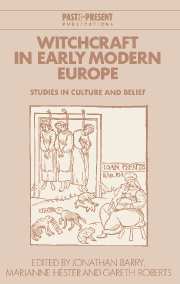Book contents
- Frontmatter
- Contents
- Preface
- Contributors
- 1 Introduction: Keith Thomas and the problem of witchcraft
- PART 1 THE CRIME AND ITS HISTORY
- PART 2 WITCHCRAFT AND RELIGION
- PART 3 THE MAKING OF A WITCH
- 7 The descendants of Circe: witches and Renaissance fictions
- 8 Witchcraft and fantasy in early modern Germany
- 9 The devil in East Anglia: the Matthew Hopkins trials reconsidered
- PART 4 WITCHCRAFT AND THE SOCIAL ENVIRONMENT
- PART 5 DECLINE
- Index
- Past and Present Publications
7 - The descendants of Circe: witches and Renaissance fictions
Published online by Cambridge University Press: 06 July 2010
- Frontmatter
- Contents
- Preface
- Contributors
- 1 Introduction: Keith Thomas and the problem of witchcraft
- PART 1 THE CRIME AND ITS HISTORY
- PART 2 WITCHCRAFT AND RELIGION
- PART 3 THE MAKING OF A WITCH
- 7 The descendants of Circe: witches and Renaissance fictions
- 8 Witchcraft and fantasy in early modern Germany
- 9 The devil in East Anglia: the Matthew Hopkins trials reconsidered
- PART 4 WITCHCRAFT AND THE SOCIAL ENVIRONMENT
- PART 5 DECLINE
- Index
- Past and Present Publications
Summary
This chapter begins with a magician's epilogue:
Now my charms are all o'erthrown,
And what strength I have's mine own,
Which is most faint.
The words are Keith Thomas' at the beginning of the last chapter of Religion and the Decline of Magic. The appropriation involved in the text's conceit of Keith Thomas as Prospero is wittily apt: at the end of their magical works, both Thomas and Prospero contemplate the decline of magic (the title of Thomas' last chapter), both ask for release from their labours, perhaps both anticipate the cooperation and applause of their audiences with ‘the help of your good hands’. There are further consequences to this historian of magic speaking the words of a Renaissance magician from a play. For Thomas' appropriation causes his text to play at this moment between Renaissance history and Renaissance fictions, so that we glimpse not only Keith Thomas as Prospero, but also Prospero as Keith Thomas. As a result of Thomas' appropriation, we can catch sight in The Tempest, particularly in Prospero's famous renunciation of magic, as well as in this epilogue, of Prospero contemplating the prospect of magic's decline in the seventeenth century, and perhaps even the decline in that century of princely theurgy as it was exercised in what Orgel has called the ‘illusion of power’ of the Jacobean and Caroline court masque.
To extend this play between history and fiction in Thomas' epigraph a little further: it is extraordinarily difficult to get at any ‘history’ of events in The Tempest in a version not mediated to us by Prospero's authority, retelling or memory.
- Type
- Chapter
- Information
- Witchcraft in Early Modern EuropeStudies in Culture and Belief, pp. 183 - 206Publisher: Cambridge University PressPrint publication year: 1996
- 9
- Cited by

